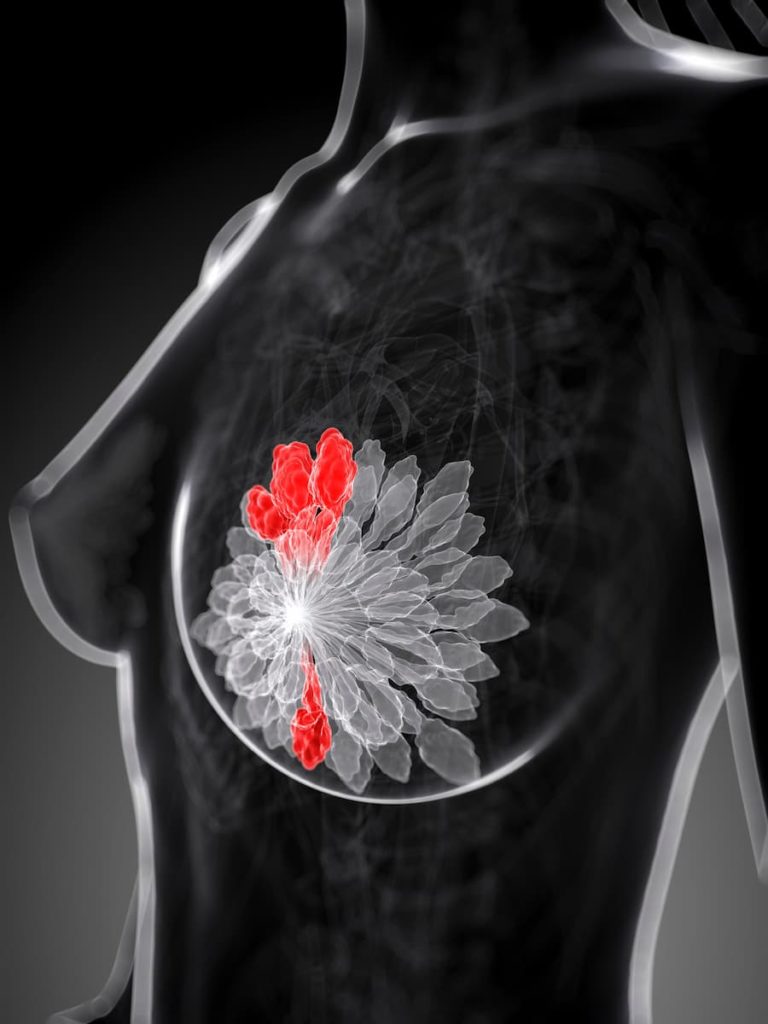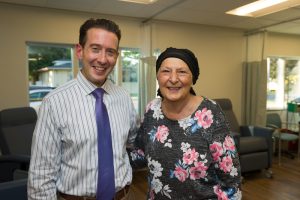
Early Signs of Inflammatory Breast Cancer
Regional Cancer Care Associates (RCCA) provides comprehensive treatment of cancer and blood disorders to patients throughout New Jersey, Connecticut, Maryland, and the Washington, DC, area.
HIPAA Alert: Potential Data Breach Learn More
Questions on Oncology, Hematology and/or Infusion Clinical Services due to COVID-19 Crisis – CALL 833-698-1623
Important Information for Our Patients Regarding the Coronavirus.
RCCA Providing Area Cancer Patients with Access to Care During Coronavirus Outbreak
RCCA Offering Patients Virtual Visits During Coronavirus Pandemic

Breast cancer symptoms typically are consistent for many forms of the disease, although some signs may be specific to each type. Common signs of breast cancer include:
This form of breast cancer is characterized by the overproduction of human epidermal growth factor receptor 2 (HER2), a type of protein receptor controlling how cells grow and divide. Considered aggressive due to the speed of tumor growth, HER2-positive cases account for up to 20% of breast cancer diagnoses. Subtypes of HER2-positive breast cancer include:
Responsible for about 15% of breast cancer diagnoses, triple-negative breast cancer cells do not have estrogen or progesterone receptors. HER2 protein receptors usually are not present in these cases, but minuscule amounts of HER2 might be present, though not enough to warrant a positive test result. This is how the type of breast cancer gets its name, as the cells test negative for estrogen, progesterone, and HER2.
Triple-negative cells generally grow and spread faster than other types of the cancerous breast cells. After a person with breast cancer is treated and the disease goes into remission, triple-negative breast cancer is more likely than other forms of the disease to recur in the following three years. However, after five years without recurrence, it is less likely to return than some other types of breast cancer. Compared to the risk for other forms of breast cancer, the risk for triple-negative breast cancer is higher in women younger than 50 years, those of Black and Hispanic origin, obese individuals, and those with the BRCA1 or BRCA2 mutation.
Traditionally, patients with HER2-positive and triple-negative breast cancer diagnoses faced poor prognoses. According to Maurice Cairoli, MD, a board-certified oncologist at RCCA’s Moorestown, NJ, office, it all began to change for the better in 2000.
For those with HER2-positive breast cancer, a revolutionary drug targeting the HER2 protein, along with other treatment advances, started reversing mortality rates in ways never before seen.
Today, even in patients whose HER2-positive breast cancer resisted prior treatment, antibody-drug conjugates are continuing to improve outcomes. An emerging treatment, antibody-drug conjugates deliver targeted chemotherapy directly into cancerous cells, and they minimize damage to nearby healthy tissues.
An April 2023 study reported in The Lancet found that one antibody-drug conjugate may be effective after a different medication has become ineffective. Findings like these not only provide hope but also more treatment options for patients with HER2-positive breast cancer. While these kinds of medications can produce side effects, researchers believe antibody-drug conjugates display an encouraging benefit-risk ratio.
Much more is known about triple-negative breast cancer than ever before.
“We talk about these being aggressive tumors, but if these tumors don’t relapse within the first two to three years of diagnosis, it’s unlikely they’re ever going to relapse,” says RCCA’s Dr. Cairoli.
“With hormone-receptor-positive breast cancers, we can never say to our patients that they are cured. There’s always a risk of occurrence that’s ongoing for 10 to 20 years after diagnosis. That’s not true of triple-negative cancer. You can tell patients that if three years have gone by and they haven’t relapsed, they probably aren’t going to. But we have to get folks through those first two or three years.”
At the 2023 Miami Breast Cancer Conference, Priyanka Sharma, M.D., Professor of Medicine at the University of Kansas Medical Center, discussed the discovery of immune checkpoint blockades, an effective treatment for early-stage triple-negative breast cancer.
Several breast cancer trials reported positive responses in patients with triple-negative diagnoses. Dr. Sharma also noted that platinum-based chemotherapy agents “have demonstrated improvement in pathologic complete response rates.”
Researchers are constantly looking for new treatments, like combination therapies targeting metastasized breast cancer cells, which will advance the fight against breast cancer.
“There are many potential treatments for triple-negative breast cancer in the drug-development pipeline,” adds Mohammad Pazooki, MD, a board-certified oncologist at RCCA’s Hartford and Manchester offices in Connecticut.
Routine cancer screenings are highly recommended for all individuals, as these diagnostic tests can determine the presence of the disease in its earliest stages. For women, maintaining a regular mammogram schedule is a must. Physicians may make personalized recommendations for frequency based on individual risk factors. “Unfortunately, there’s no such thing as ‘too young.’ Breast cancers can occur in patients even in their 20s,” says Dr. Cairoli.
Generally, women should receive mammograms aligning with these guidelines, which represent an amalgam of recommendations from various organizations:
In addition to cancer screenings, education around self-examinations has helped women become more proactive about their breast health. By knowing how their breasts normally look and feel, as well as by regularly checking for changes and lumps, women can report concerns to their physicians right away for prompt evaluation of any potential problems.
“Monthly breast self-exams haven’t been shown to improve outcomes for the population at large, but by knowing your body, you’ll be able to alert your physician if you notice a change,” adds Dr. Cairoli.
As with all types of cancer, the earlier breast cancer is detected, the more likely treatment results will be favorable. In some cases, early detection also can expand the treatment options available to a patient.
When it comes to aggressive HER2-positive and triple-negative breast cancers, early detection with routine screening has contributed to improved survival rates.
As one of the largest networks of cancer specialists in the United States, Regional Cancer Care Associates offers the latest advances in cancer treatment. After women are diagnosed, RCCA’s board-certified medical oncologists tailor individualized treatment plans based on the type of breast cancer, its severity, and other factors, such as the patient’s age and overall health.
“It’s an exciting time in the fight against breast cancer,” says Aileen L. Chen, M.D., a board-certified oncologist at RCCA’s Freehold and Holmdel, NJ, offices. “Next-generation sequencing technology is detecting genetic mutations that we can treat with targeted therapies in many forms of the disease. This has enhanced our ability to practice ‘personalized medicine’ by customizing a patient’s treatment based on her molecular and genetic profiles.”
Whether treating HER2-positive or triple-negative breast cancer, the first course of action usually is surgery. Before the procedure, patients are started on neoadjuvant therapy, which might include chemotherapy to shrink the tumor, reduce the area requiring surgery, and possibly avoid mastectomy removal of the entire breast).
There are several types of breast cancer surgeries, including:
After this initial phase of treatment, approaches differ depending on the type of breast cancer. A combination of medications and non-invasive modalities, such as the following, may be included in a patient’s HER2-positive or triple-negative breast cancer treatment plan:
In treating HER2-positive breast cancer, chemotherapy often is combined with targeted therapy.
Endocrine therapy, also known as hormone therapy, may be prescribed to lower estrogen levels, as this hormone, along with progesterone, can fuel tumor growth.
In premenopausal women, selective estrogen receptor modulators (SERMs) are the class of drugs typically used for endocrine/hormone therapy. In postmenopausal women, aromatase inhibitors (AIs) typically are prescribed to block estrogen production.
Ovarian suppression also can be achieved with gonadotropin-releasing hormone (GnRH) agonists, which temporarily halt estrogen production. Some women even have their ovaries surgically removed or treated radiation, stopping hormone production.
Though treatment options are more limited in triple-negative breast cancer, intensive research continues to pursue new and emerging therapies.
“The problem with triple-negative breast cancer is that we don’t have a known, specific receptor to target,” explains Deena Graham, MD., who practices at RCCA’s Hackensack and North Bergen, NJ, locations.
“Triple-negative breast cancers often present with larger tumors and multiple lymph nodes involved, and they may be more aggressive. Some triple-negative cancers don’t respond well to treatment, but others do,” Dr. Graham notes.
Chemotherapy may be given before or after surgery to destroy cancer cells and shrink tumors. Poly ADP-ribose polymerase (PARP) inhibitor drugs, which target DNA damage in cancerous cells, may be administered in conjunction with other treatments for advanced triple-negative breast cancer marked by BRCA gene mutations.
Radiation therapy sometimes follows surgery, delivering high-energy X-rays to destroy any remaining cancer cells. Additionally, immunotherapy can help boost the patient’s immune system to fight breast cancer more effectively.
Breast cancer clinical trials also are available for patients with triple-negative cases. Clinical trials provide patients with access to the latest approaches to enhancing care and outcomes.
“I always recommend clinical trials for women who are diagnosed with aggressive forms of breast cancer,” adds Dr. Graham. “We can potentially make your treatment even better.”
At Regional Cancer Care Associates, Drs. Cairoli, Chen, Graham, and Pazooki are joined by more than 80 other cancer specialists. The team treats patients at numerous community-based cancer care centers across New Jersey, Connecticut, Maryland, and the Washington, D.C., area.
Each year, RCCA treats more than 22,000 new patients and provides care to more than 225,000 established patients. Working collaboratively with patients’ other physicians, RCCA offers the latest in innovative treatments, from immunotherapy and targeted therapy to clinical trials.
In addition to treating solid tumors, blood-based cancers, and benign blood disorders like anemia, RCCA also provides infusion services. These intravenously administer medications to treat a variety of non-oncologic conditions, including multiple sclerosis, Crohn’s disease, asthma, and rheumatoid arthritis.
For more information about HER2-positive and triple-negative breast cancer treatment, contact RCCA today. Patients who have been diagnosed with cancer and are seeking state-of-the-art care can request an appointment at any of RCCA’s more than 20 locations in New Jersey, Connecticut, Maryland, and the Washington, D.C., area.
For more information or to schedule an appointment,
call 844-346-7222. You can also schedule an appointment by calling the RCCA location nearest you.

Regional Cancer Care Associates (RCCA) provides comprehensive treatment of cancer and blood disorders to patients throughout New Jersey, Connecticut, Maryland, and the Washington, DC, area.

When people think of breast cancer, they generally think of it affecting women. However, in rare circumstances, breast cancer can affect men, most commonly in

First diagnosed with breast cancer in 1992, she has persevered in her battle against the disease for more than 30 years.

Regional Cancer Care Associates is one of fewer than 200 medical practices in the country selected to participate in the Oncology Care Model (OCM); a recent Medicare initiative aimed at improving care coordination and access to and quality of care for Medicare beneficiaries undergoing chemotherapy treatment.